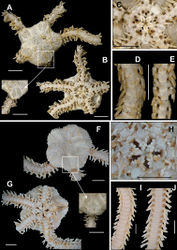Difference between revisions of "Ophiocnida scabriuscula"
m (Imported from ZooKeys) |
m (1 revision) |
(No difference)
| |
Latest revision as of 12:47, 10 June 2013
| Notice: | This page is derived from the original publication listed below, whose author(s) should always be credited. Further contributors may edit and improve the content of this page and, consequently, need to be credited as well (see page history). Any assessment of factual correctness requires a careful review of the original article as well as of subsequent contributions.
If you are uncertain whether your planned contribution is correct or not, we suggest that you use the associated discussion page instead of editing the page directly. This page should be cited as follows (rationale):
Citation formats to copy and paste
BibTeX: @article{Gondim2013ZooKeys307, RIS/ Endnote: TY - JOUR Wikipedia/ Citizendium: <ref name="Gondim2013ZooKeys307">{{Citation See also the citation download page at the journal. |
Ordo: Ophiurida
Familia: Amphiuridae
Genus: Ophiocnida
Name
Ophiocnida scabriuscula (Lütken, 1859) – Wikispecies link – Pensoft Profile
Description
Disk circular with slight indentations in interradius (dd = 4.45 mm). Dorsal and ventral surfaces covered by numerous small spines, also in between the radial shields (Fig. 6e). Scales numerous on disk, imbricating and of different sizes, the largest surrounding the radial shields. Radial shields longer than wide, divergent and with two small accessory plates (Fig. 6e). Bursal slits long. Oral shields arrowhead-shape (Fig. 6g). Adoral shields enlarged laterally. Two oral papillae on each side of jaw angle, small, rounded, and slightly elongated (Fig. 6g). Dorsal arm plate rectangular, narrow, with distal margin rounded (Fig. 6h). Ventral arm plate pentagonal (Fig. 6i). Two small tentacle scales. Three arm spines slightly flattened, the dorsal one slightly longer and wider than the other two.
Distribution
Bermuda, Florida, the islands off southern Florida, the Antilles, Mexican Caribbean, Panama, Colombia, Venezuela, and Brazil (Hendler et al. 1995[1], Hernández-Herrejón et al. 2008[2]). In Brazil from Maranhão (Albuquerque 1986[3]), Paraíba (Gondim et al. 2008[4], 2011[5]), Pernambuco (Lima and Fernandes 2009[6]), Alagoas (Lima et al. 2011[7]), Bahia (Rathbun 1879[8], Magalhães et al. 2005[9]), Abrolhos off southern Bahia, Rio de Janeiro, São Paulo, and Paraná (Tommasi 1970[10]). Intertidal to 68 m. Recorded in this study between 18 and 30 m.
Remarks
This littoral species has a limited bathymetric distribution (H.L. Clark 1933[11]). It is known from hard substrates (sand and gravel) (Tommasi 1970[10]) and from marine seagrasses (Hendler et al. 1995[1]). We observed the formation of a third tentacle scale in some arm segments.
Taxon Treatment
- Gondim, A; Alonso, C; Dias, T; Manso, C; Christoffersen, M; 2013: A taxonomic guide to the brittle-stars (Echinodermata, Ophiuroidea) from the State of Paraíba continental shelf, Northeastern Brazil ZooKeys, 307: 45-96. doi
Other References
- ↑ 1.0 1.1 Hendler G, Miller J, Pawson D, Kier P (1995) Sea stars, sea urchins and allies: echinoderms of Florida and the Caribbean. Smithsonian Institution Press, Washington, 390 pp.
- ↑ Hernandéz-Herrejón L, Solís-Marín F, Laguarda-Figueras A (2008) Ophiuroids (Echinodermata: Ophiuroidea) from the Mexican waters of the Gulf of Mexico. Revista de Biologia Tropical 56: 83-167.
- ↑ Albuquerque M (1986) Ophiuroidea Gray, 1840 (Echinodermata) da plataforma continental do norte e nordeste brasileiro. PhD thesis, São Paulo: University of São Paulo.
- ↑ Gondim A, Lacouth P, Alonso C, Manso C (2008) Echinodermata da Praia do Cabo Branco, João Pessoa, Paraíba, Brasil. Biota Neotropica 8: 151–159. http://www.biotaneotropica.org.br/v8n2/pt/abstract?inventory+bn02408022008, doi: 10.1590/S1676-06032008000200016
- ↑ Gondim A, Dias T, Campos F, Alonso C, Christoffersen M (2011) Macrofauna bêntica do Parque Estadual Marinho de Areia Vermelha, Cabedelo, Paraíba, Brasil. Biota Neotropica 11: 75–86. http://www.biotaneotropica.org.br/v11n2/en/abstract?article+bn01811022011, doi: 10.1590/S1676-06032011000200009
- ↑ Lima E, Fernandes M (2009) Diversidade de equinodermos (Echinodermata) no Estado de Pernambuco (Brasil). Revista Brasileira de Zoociências 11: 55-63.
- ↑ Lima M, Correia M, Sovierzoski H, Manso C (2011) New records of Ophiuroidea (Echinodermata) from shallow waters off Maceió, State of Alagoas, Brazil. Marine Biodiversity Records 4: 1-10. doi: 10.1017/S175526721100090X
- ↑ Rathbun R (1879) A list of the Brazilian echinoderms, with notes on their distribution. Transactions Academy of Arts and Science 5: 139-158.
- ↑ Magalhães W, Martins L, Alves O (2005) Inventário dos Echinodermata do Estado da Bahia. Brazilian Journal of Aquatic Science and Technology 9: 61-65.
- ↑ 10.0 10.1 Tommasi L (1970) Os ofiuróides recentes do Brasil e de regiões vizinhas. Contribuições do Instituto Oceanográfico, Universidade de São Paulo Série Oceanografia Biológica 20: 1–146. doi: 10.1590/S0373-55241971000100001
- ↑ Clark H (1933) A handbook of the littoral echinoderms of Porto Rico and other West Indian Islands. Scientific Survey of Porto Rico and the Virgin Islands 16: 1-147.
Images
|
